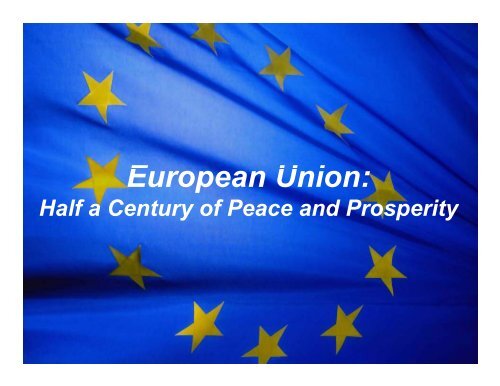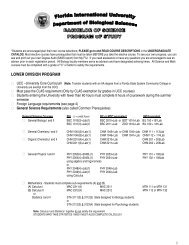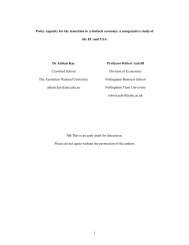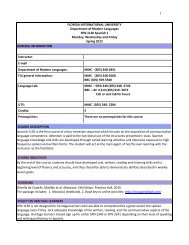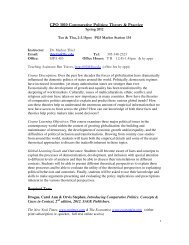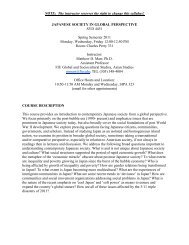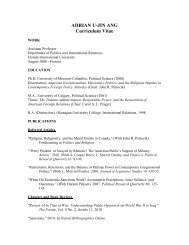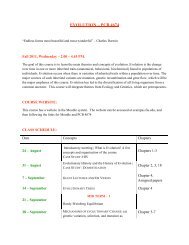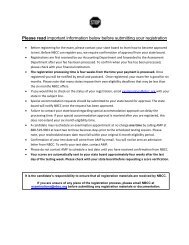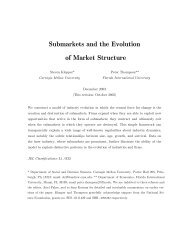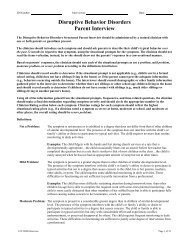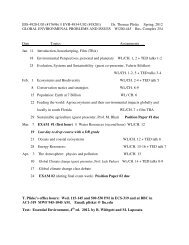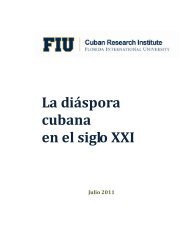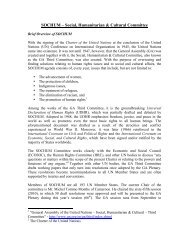The European Union
The European Union
The European Union
Create successful ePaper yourself
Turn your PDF publications into a flip-book with our unique Google optimized e-Paper software.
<strong>The</strong> <strong>European</strong> <strong>Union</strong><br />
E<strong>European</strong> U<strong>Union</strong>: i<br />
Half a Century y of Peace and Prosperity p y
27<br />
Combined<br />
population of<br />
EU Member<br />
States<br />
7.5<br />
60<br />
Member States<br />
500<br />
million<br />
Percent of world’s<br />
population<br />
Percent of f<br />
global GDP<br />
30<br />
Percent of combined<br />
worldwide Official<br />
Development Assistance<br />
<strong>The</strong> <strong>European</strong> <strong>Union</strong><br />
Introduction<br />
• <strong>The</strong> <strong>European</strong> <strong>Union</strong> (EU) has brought<br />
political stability and economic prosperity<br />
to its citizens.<br />
• It has created a frontier-free single<br />
market and a single currency, the euro.<br />
• It has reunited a fractured continent.<br />
• It is a major economic and commercial<br />
power and the world’s world s biggest donor of<br />
development aid to poorer countries.<br />
• Its membershipp has grown g from six to<br />
twenty-seven nations, bringing the EU’s<br />
population to nearly half a billion.
<strong>The</strong> <strong>European</strong> <strong>Union</strong><br />
United in Diversity<br />
• Though richly diverse, EU countries are<br />
united in their commitment to peace, p ,<br />
democracy, the rule of law and respect for<br />
human rights.<br />
• <strong>The</strong>y seek to promote these values in the<br />
wider world, to build and share prosperity<br />
and to exert their collective influence by<br />
actingg together g on the world stage. g
Historical Development<br />
<strong>The</strong> <strong>European</strong> <strong>Union</strong><br />
Step by Step
<strong>The</strong> <strong>European</strong> <strong>Union</strong><br />
War and Peace<br />
• <strong>The</strong> aim in the aftermath of two world wars, where more than 100<br />
million people in Europe lost their lives, was to secure peace between<br />
Europe’s victorious and vanquished nations and bring them together as<br />
equals, cooperating within shared institutions.<br />
• <strong>The</strong> French economic advisor and politician Jean Monnet, came up with<br />
the idea that the governments of France and Germany - both rich on<br />
coal and steel – should no longer run their own coal and steel<br />
industries.<br />
• Instead, these industries should be organized by people from all the<br />
countries involved. In this way, none can on its own make the weapons<br />
of war to turn against the other, as in the past.
<strong>The</strong> <strong>European</strong> <strong>Union</strong><br />
Europe Day, May 9<br />
• On Mayy 9, , 1950, , Robert Schuman<br />
presented his proposal on the creation of an<br />
organized Europe, indispensable to the<br />
maintenance of peaceful relations.<br />
• This proposal, known as the "Schuman<br />
declaration", is considered to be the<br />
beginning of the creation of what is now the<br />
<strong>European</strong> <strong>Union</strong> <strong>Union</strong>.<br />
• Today, May 9th has become a <strong>European</strong><br />
symbol sy bo (Europe ( u ope Day) ay) which, c , along ao g with t the t e<br />
flag, the anthem, the motto and the single<br />
currency (the euro), identifies the political<br />
entity of the <strong>European</strong> <strong>Union</strong>. Europe Day is<br />
the occasion for activities and festivities<br />
that bring Europe closer to its citizens and<br />
peoples of the <strong>Union</strong> closer to one another.
1951<br />
Founding<br />
Members<br />
Belgium<br />
France<br />
Germany<br />
Italy<br />
LLuxembourg b<br />
Netherlands<br />
<strong>The</strong> <strong>European</strong> <strong>Union</strong>
<strong>The</strong> <strong>European</strong> <strong>Union</strong><br />
1957, Treaty of Rome<br />
• IIn 1957 1957, th the six i ffounding di countries ti ddecided id d tto bbuild ild a E<strong>European</strong><br />
Economic Community (EEC), based on a wider common market<br />
covering a whole range of goods and services.<br />
• <strong>The</strong> common market was established with the Treaty of Rome 1957.<br />
• <strong>The</strong> common market intended to eliminate all trade barriers between<br />
the six countries with the aim of increasing economic prosperity.
<strong>The</strong> <strong>European</strong> <strong>Union</strong><br />
1986, Internal Market<br />
• A lack of progress led the Community in the mid-1980s to consider a<br />
more thorough approach to the objective of removing trade barriers,<br />
with more effective methods: the internal market.<br />
• Thi This wasprimarily i il sett outt iin th the celebrated l b t d CCommission i i Whit White PPaper off<br />
June 1985 and incorporated in the Treaty by the 1986 Single <strong>European</strong><br />
Act.<br />
• <strong>The</strong> internal market ensured four freedoms of movement:<br />
Goods<br />
Services<br />
PPersons<br />
Capital<br />
• <strong>The</strong> internal market was completed in 1993.
EU Enlargement<br />
<strong>The</strong> <strong>European</strong> <strong>Union</strong>
<strong>The</strong> <strong>European</strong> <strong>Union</strong>
1989<br />
Fall of the Berlin Wall<br />
Unification of Germany and<br />
the return of democracy to<br />
the countries of central and<br />
eastern Europe.<br />
Soon after there was a<br />
queue of candidate countries<br />
among central and eastern<br />
<strong>European</strong> countries applying<br />
for EU membership.<br />
<strong>The</strong> <strong>European</strong> <strong>Union</strong>
<strong>The</strong> <strong>European</strong> <strong>Union</strong><br />
Conditions for Enlargement<br />
• <strong>The</strong> EU is open to any <strong>European</strong> country that fulfils the<br />
democratic, political and economic criteria for membership.<br />
• <strong>The</strong> Copenhagen Criteria:<br />
Stable institutions guaranteeing democracy, the rule of law, human<br />
rights i ht andd respectt ffor andd protection t ti off minorities. i iti<br />
A functioning market economy and the capacity to cope with<br />
competitive p pressures.<br />
p<br />
Adoption and implementation of EU law.
Candidate Countries<br />
Croatia<br />
Former Yugoslav<br />
Republic p of Macedonia<br />
Turkey<br />
Potential<br />
CCandidate did Countries<br />
C i<br />
Albania<br />
Bosnia & Herzegovina<br />
Montenegro<br />
Serbia including Kosovo<br />
under UN Security Council<br />
Resolution 1244<br />
<strong>The</strong> <strong>European</strong> <strong>Union</strong>
<strong>The</strong> <strong>European</strong> <strong>Union</strong><br />
<strong>The</strong> Euro - One Currency for One Europe
<strong>The</strong> <strong>European</strong> <strong>Union</strong><br />
1999, Introduction of the €uro<br />
• <strong>The</strong> euro is the single currency of the<br />
EU, and was introduced in 1999.<br />
• 11, then, 15 countries adopted the<br />
euro as a virtual currency in 1999 – in<br />
2002 the euro notes and coins were<br />
iissued. d<br />
• Today 17 out of 27 EU countries have<br />
adopted d d the h euro.<br />
• <strong>The</strong> euro has become an attractive<br />
world ld currency lk like the h USdollar.<br />
d ll
<strong>The</strong> <strong>European</strong> <strong>Union</strong>
<strong>The</strong> <strong>European</strong> <strong>Union</strong>
<strong>The</strong> <strong>European</strong> <strong>Union</strong>
<strong>The</strong> <strong>European</strong> <strong>Union</strong>
<strong>The</strong> <strong>European</strong> <strong>Union</strong><br />
Advantages of the €uro<br />
• Having the euro as a common currency for a large part of Europe has<br />
been very helpful during the crisis.<br />
• It has made it easier for the EU to react to the global g credit crunch in a<br />
coordinated way and it provided more stability than would otherwise<br />
have been possible.<br />
• So far, EU governments have pumped more than €2 trillion into the<br />
rescue effort effort, as well as coordinated interventions interventions, supporting banks<br />
and allowing guarantees for lending among Member States.<br />
• <strong>The</strong> single currency benefits everybody:<br />
<strong>The</strong> cost of changing money when travelling or doing business within the euro<br />
area has disappeared.<br />
<strong>The</strong> cost of making cross-border payments has in most cases either<br />
disappeared or been reduced significantly.<br />
Consumers and businesses can compare prices more readily, which<br />
stimulates competition.
<strong>The</strong> <strong>European</strong> <strong>Union</strong><br />
• <strong>The</strong> ECB was set up in 1998 under the Treaty on <strong>European</strong> <strong>Union</strong>,<br />
and is based in Frankfurt (Germany).
<strong>The</strong> <strong>European</strong> <strong>Union</strong>
<strong>The</strong> <strong>European</strong> <strong>Union</strong><br />
Decision-Making<br />
• <strong>The</strong> decision-making process of the EU involves three<br />
main institutions:<br />
<strong>The</strong> <strong>European</strong> Commission<br />
<strong>The</strong> <strong>European</strong> Parliament<br />
<strong>The</strong> Council of the <strong>European</strong> <strong>Union</strong><br />
• This institutional triangle produces the policies and laws<br />
that apply throughout the EU.<br />
• In principle, it is the Commission that proposes new<br />
laws, but it is the Parliament and Council that adopt<br />
them. <strong>The</strong> Commission and the member states then<br />
implement them them, and the Commission ensures that the<br />
laws are properly taken on board.
<strong>The</strong> <strong>European</strong> <strong>Union</strong><br />
<strong>European</strong> Commission<br />
• <strong>The</strong> <strong>European</strong> Commission represents and uphold the interests of the<br />
EU as a whole. It drafts proposals for new <strong>European</strong> laws, which it<br />
presents to the <strong>European</strong> Parliament and the Council.<br />
• I It is i also l the h EU’s EU’ executive i arm – i in other h words, d it i is i responsible ibl for f<br />
implementing the decisions of Parliament and the Council. That means<br />
managing the day-to-day business of the <strong>European</strong> <strong>Union</strong> by<br />
implementing its policies, running its programmes and spending its<br />
bbudget. d t<br />
• <strong>The</strong> <strong>European</strong> Commission was set up in the 1950s under the EU’s<br />
founding treaties.<br />
• <strong>The</strong> <strong>European</strong> Commission has its seat in Brussels.
<strong>The</strong> <strong>European</strong> <strong>Union</strong><br />
<strong>European</strong> Parliament<br />
• <strong>The</strong> <strong>European</strong> Parliament (EP) is the only representative body in the<br />
world directly elected by citizens from different countries (all EU<br />
Member States).<br />
• El Elections ti are hheld ld every fi five years, andd every EU citizen iti iis entitled titl d tto<br />
vote, and to stand as a candidate, wherever they live in the EU.<br />
• Every month the EP meets to discuss the new laws being proposed by<br />
the <strong>European</strong> Commission. If the EP does not agree with the proposal,<br />
it can ask the <strong>European</strong> Commission to change it.<br />
• <strong>The</strong> present parliament has 736 members from all 27 EU countries.<br />
• <strong>The</strong> <strong>European</strong> Parliament was set up in the 1950s under the EU’s<br />
<strong>The</strong> <strong>European</strong> Parliament was set up in the 1950s under the EU s<br />
founding treaties and has its seat in Strasbourg.
<strong>The</strong> <strong>European</strong> <strong>Union</strong><br />
Council of the <strong>European</strong> <strong>Union</strong><br />
• <strong>The</strong> Council is one of the two main decision-makingg bodies of the EU<br />
(the other being the <strong>European</strong> Parliament).<br />
• It represents the member states, and its meetings are attended by one<br />
minister from each of the EU’s EU s national governments<br />
governments.<br />
• Which ministers attend what meeting depends on what subjects are on<br />
the agenda. If, for example, the Council is to discuss environmental<br />
issues, the meeting will be attended by the Environment Minister from<br />
each EU country and it will be known as the ‘Environment Council’.<br />
• <strong>The</strong> Council of the <strong>European</strong> <strong>Union</strong> was set up in the 1950s under the<br />
• <strong>The</strong> Council of the <strong>European</strong> <strong>Union</strong> was set up in the 1950s under the<br />
EU’s founding treaties and has its seat in Brussels.
<strong>The</strong> <strong>European</strong> <strong>Union</strong><br />
Court of Justice of the EU<br />
• If a country does not apply the law properly, the <strong>European</strong> Commission<br />
may complain and ultimately bring the case to the Court of Justice of<br />
the EU.<br />
• <strong>The</strong> Court of Justice of the EU makes sure that EU laws are respected,<br />
and are applied in the same way everywhere. It has one judge from<br />
each EU country.<br />
• <strong>The</strong> Court of Justice of the EU was set up in the 1950s under the EU’s<br />
founding treaties and has its seat in Luxembourg.
<strong>The</strong> <strong>European</strong> <strong>Union</strong>
<strong>The</strong> <strong>European</strong> <strong>Union</strong><br />
2009: <strong>The</strong> Lisbon Treaty<br />
• <strong>The</strong> Lisbon Treaty entered into force on December 1, 2009, and amends the<br />
current EU and EC treaties, without replacing them.<br />
• <strong>The</strong> Lisbon Treaty is a response to all the changes the EU have seen over the last<br />
50+ years, including its growth from six to 27 countries and an expansion of the<br />
number of policy areas the EU now deals with.<br />
• Key institutional changes:<br />
A more democratic and transparent Europe<br />
A more efficient Europe<br />
A Europe E of f rights i ht and d values, l freedom, f d solidarity lid it and d security it<br />
A more visible Europe on the global stage
A More Efficient Europe:<br />
<strong>The</strong> <strong>European</strong> <strong>Union</strong><br />
<strong>The</strong> Lisbon Treaty (cont’d)<br />
• <strong>The</strong> <strong>European</strong> Council becomes an official EU institution, headed for<br />
the first time by a full time President for greater coherence and<br />
consistency in EU actions actions.<br />
• In the Council of Ministers, qualified majority voting (instead of<br />
unanimous decisions) ) will be extended.<br />
• Qualified majority voting means that from 2014, decisions of the<br />
Council of Ministers will need support of 55% of the Member States,<br />
representing at least 65% of the <strong>European</strong> population population. This system<br />
gives double legitimacy to decisions.
<strong>The</strong> <strong>European</strong> <strong>Union</strong><br />
<strong>The</strong> Lisbon Treaty (cont’d)<br />
A Europe of Rights and Values, Values Freedom, Freedom Solidarity and Security :<br />
• Reinforcement of the democratic values and underpinning the EU:<br />
human dignity, freedom, democracy, equality, rule of law, respect<br />
for human rights.<br />
• Guarantee of the freedoms and principles in the Charter of<br />
Fundamental Rights.<br />
• Solidarity between Member States in the event of a terrorist attack<br />
or natural or man-made disaster.<br />
• Extended capacity to act on freedom, security and justice including<br />
the fight against crime and terrorism.
A more visible Europe on the global stage:<br />
<strong>The</strong> <strong>European</strong> <strong>Union</strong><br />
<strong>The</strong> Lisbon Treaty (cont’d)<br />
• To promote the EU’s EU s actions on the international scene and to<br />
defend its interests and values abroad by speaking with one voice:<br />
A new position of High Representative for Foreign Affairs and<br />
Security Policy/Vice President of the Commission and a new<br />
<strong>European</strong> External Action Service has been created.<br />
Catherine Ashton has been appointed High Representative for<br />
FForeign i Aff Affairs i andd SSecurity it PPolicy/Vice li /Vi PPresident id t off th the<br />
Commission.
• EU citizens benefit in numerous ways:<br />
Consistent delivery of important services, from education<br />
to health care to transportation, which must meet<br />
agreed-upon standards.<br />
Products such as food or medical supplies will be safe<br />
and environmentally sound regardless of where they<br />
originate in the EU.<br />
Men and women must receive equal pay for equal work,<br />
a requirement that reflects the EU’s EU s pioneering role in the<br />
fight for women’s rights.<br />
EU citizens know they are free to live in any EU country<br />
and have equal access to justice throughout the EU<br />
countries, , as well as their fundamental rights g protected.<br />
p<br />
<strong>The</strong> ERAMUS Programme enables more than 180,000<br />
students to study and work abroad each year, as well as<br />
supports co-operation actions between higher education<br />
institutions across Europe. p<br />
<strong>The</strong> <strong>European</strong> <strong>Union</strong><br />
Impact
<strong>The</strong> <strong>European</strong> <strong>Union</strong><br />
Impact<br />
• <strong>The</strong> Schengen area and cooperation are<br />
founded on the Schengen Agreement of<br />
1985.<br />
• <strong>The</strong> Schengen area represents a territory<br />
where the free movement of persons is<br />
guaranteed. <strong>The</strong> signatory states to the<br />
agreement g<br />
have abolished all internal<br />
borders in lieu of a single external border.<br />
Here common rules and procedures are<br />
applied with regard to visas for short stays,<br />
asylum requests and border controls.<br />
• Simultaneously, to guarantee security within<br />
the Schengen area, cooperation and<br />
coordination between police services and<br />
judicial authorities have been stepped up.
• Peace and Security:<br />
<strong>The</strong> <strong>European</strong> <strong>Union</strong><br />
Global Impact<br />
<strong>The</strong> EU is engaged in rebuilding lives and<br />
communities in areas of conflict such as<br />
Afghanistan and the former Yugoslavia.<br />
<strong>The</strong> EU supports efforts to achieve peace in the<br />
Middle East.<br />
• Counterterrorism and Homeland and Security:<br />
<strong>The</strong> EU takes steps to improve intelligence sharing,<br />
enhance law enforcement and judicial cooperation,<br />
curtail terrorist financing.<br />
<strong>The</strong> EU boost trade and transport security to<br />
support the struggle against terrorism.
• Democracy and Human Rights:<br />
<strong>The</strong> EU works globally for free elections and open<br />
democratic processes.<br />
<strong>The</strong> EU fights racism and intolerance both inside and<br />
outside the EU.<br />
<strong>The</strong> EU campaigns against capital punishment.<br />
• Development Assistance and Humanitarian Relief:<br />
<strong>The</strong> EU is the largest providers of development<br />
assistance around the world – from combating poverty<br />
to fighting HIV/AIDS and other communicable<br />
diseases.<br />
<strong>The</strong> EU provide humanitarian and reconstruction aid in<br />
the wake of natural disasters. So far, EU financial<br />
support for transport of assistance to Haiti reached<br />
€2.8 million.<br />
<strong>The</strong> <strong>European</strong> <strong>Union</strong><br />
Global Impact
• Environmental protection:<br />
<strong>The</strong> <strong>European</strong> <strong>Union</strong><br />
Global Impact<br />
<strong>The</strong>EUisaleaderinglobaleffortstoprotecttheenvironment,and<br />
plays an important role in environmental policymaking.<br />
<strong>The</strong> EU is one of the initiators of the UN’s Environment Program g<br />
(UNEP) creating a strategic approach to the international<br />
management of chemicals.<br />
Moreover, the EU is party to a number of international agreements<br />
g<br />
and partnerships, including the UN Framework Convention on<br />
Climate Change and the UN Montreal Protocol on Ozone Depletion.
"I believe that a<br />
stronger and renewed<br />
EU will be an even<br />
b better transatlantic l i<br />
partner of the United<br />
States."<br />
(President Barack Obama)<br />
<strong>The</strong> <strong>European</strong> <strong>Union</strong><br />
EU-US Relations<br />
“<strong>The</strong> relationship between<br />
the United States and<br />
Europe is the world’s<br />
strongest, most<br />
comprehensive, and<br />
strategically important<br />
partnership.”<br />
(President of the<br />
<strong>European</strong> Commission,<br />
José Manuel Barroso)
<strong>The</strong> <strong>European</strong> <strong>Union</strong><br />
EU-US Relations<br />
• <strong>The</strong> EU and the US established diplomatic relations as early as 1953,<br />
but it was only in November 1990 that the cooperation was formalised<br />
for the first time with the Transatlantic Declaration.<br />
• Since December 1995, the New Transatlantic Agenda (NTA) has<br />
provided the foundation for the relationship.<br />
• <strong>The</strong> ambitious agenda of cooperation between the EU and the US is<br />
taken forward via constant, intensive dialogue. This dialogue takes<br />
place l att various i llevels, l ffrom th the annuall summit it meetings ti bbetween t EU<br />
and US Leaders to technical work at expert level.<br />
• In order to take forward efforts to boost the transatlantic economy, the<br />
y,<br />
Transatlantic Economic Council (TEC) was created in 2007.
<strong>The</strong> <strong>European</strong> <strong>Union</strong>
<strong>The</strong> <strong>European</strong> <strong>Union</strong>
<strong>The</strong> <strong>European</strong> <strong>Union</strong>
<strong>The</strong> <strong>European</strong> <strong>Union</strong>
<strong>The</strong> <strong>European</strong> <strong>Union</strong><br />
Thank you


